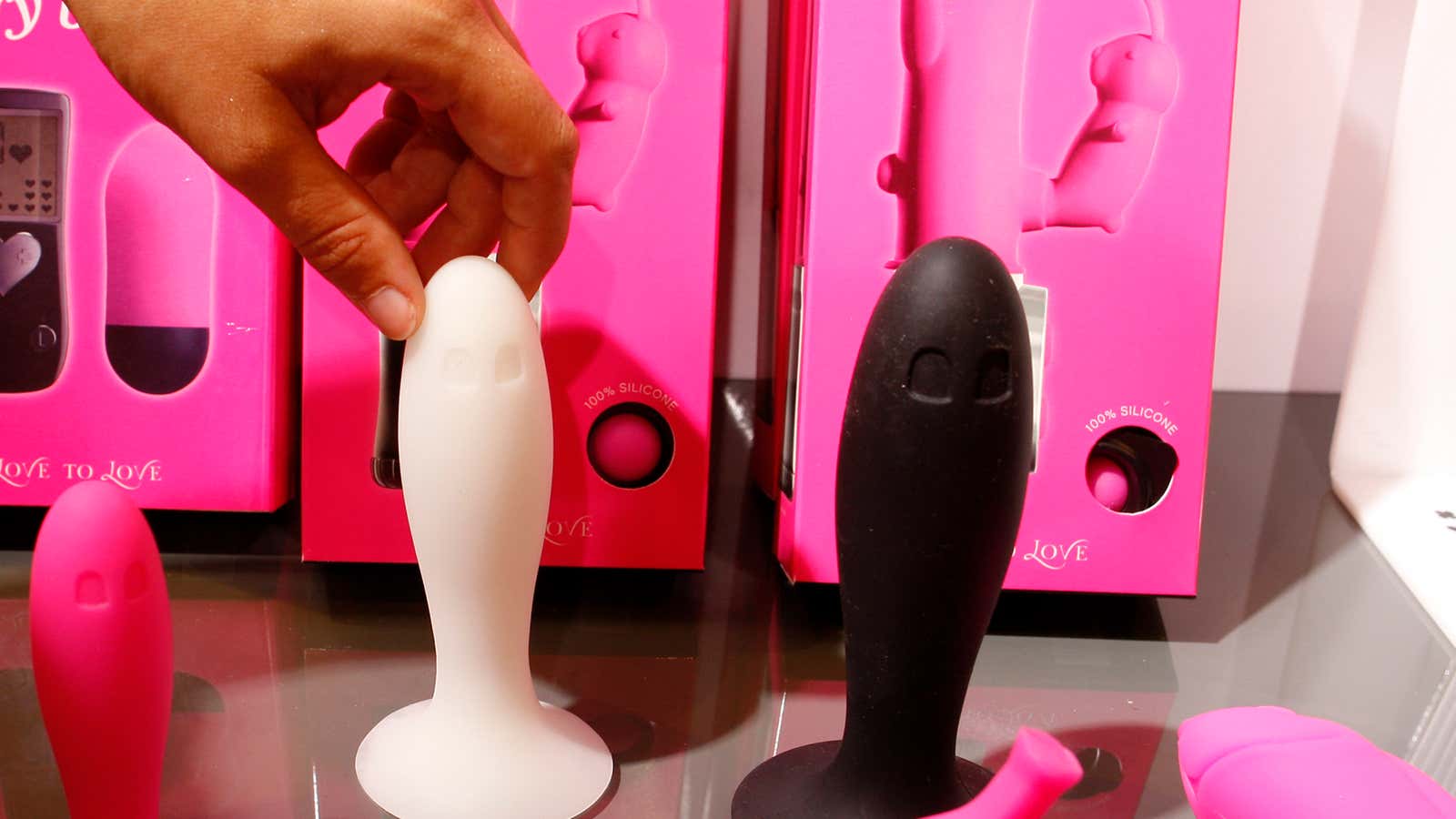The “sex sells” mantra is ubiquitous, if not hackneyed. Yet the finance community is still squeamish about sex—and by cockblocking sex-related investments, Silicon Valley’s (mostly) male-run VCs are losing a ton of opportunities to make cash. Thankfully, women are cornering the market and rebuking patriarchal oppression in the process.
Every month or two, a tight-knit group of female founders gather in New York City to discuss tech ventures aimed at enhancing human sexual experiences. Their meetings aren’t just about lucrative investments, either: With each innovation, they’re also dismantling decades of male domination and systemic misogyny in the sex industry.
The Women of Sextech is a closed community that gives female sextech business founders a space to share their stories, missions, and challenges. Led by its founders Polly Rodriguez, co-founder and CEO of Unbound Box, the monthly subscription company for sex toys and accessories, and Lidia Bonilla, founder of House of Plume, these women believe that female sexuality must be celebrated as equal to, and separate from, male sexuality. With backgrounds in advertising, engineering, sexual education, health, and finance, these high-powered, highly intelligent women have the credentials to back their mission.
The quality that unites the women in this group is a shared commitment to equality in the bedroom. “I felt a responsibility to move MakeLoveNotPorn forward as a business” says Cindy Gallop, the founder of MakeLoveNotPorn (MLNP), a video-streaming and sharing platform, and AllTheSky Holdings, the world’s first and only sextech fund, which seeks to enhance sextech business opportunities and further socialize sex. One of the foremost evangelists of sextech and one of the Women of Sextech’s founding members, Gallop notes that we cannot resolve destructive social ills like sex trafficking, sexual abuse, and sexual violence until we change our sexual behaviors and mental constructs.
Thus, Women in Sextech’s message to all VCs is to defy the status quo. Given the multitude of successful hookup apps, the reluctance to sextech is both hypocritical and short-sighted. By avoiding sextech but promoting hookup apps, VCs communicate that anonymous sex is societally permissible, but open, honest discussions about how to make sex enjoyable—for men and women—are taboo. This message entrenches patriarchal oppression and loses investors money.
For her part, Gallop has frank advice for VCs and major companies afraid of sex ventures: Get over yourselves now, or risk bypassing a highly lucrative industry.
The finance community’s sex aversion makes funding incredibly difficult for companies connected to adult content. VC prudishness is confusing at best, given that startup accelerator 500 Startups estimates the sex industry at $30.6 billion.
Sextech isn’t just handicapped by funding—they’re handicapped by anything money-related. Many banks won’t allow “adult content” businesses to open accounts, and credit card companies sometimes won’t process payments for their products, for fear of stigma and chargebacks.
Then there’s always the chance that Google or Apple will reject sex-related apps. That’s what happened to Tina Gong, whose app HappyPlayTime was rejected by Apple in 2014. Gong launched HappyPlayTime, which identifies as a “series of sex-education games and tools whose aim is to eliminate the stigma around female masturbation,” in response to her early experiences of sexual objectification. The goal of the touchscreen game is to make a “cute” vagina avatar climax, and it also teaches girls how their bodies work in fun and healthy ways. Despite Apple’s rejection, Gong is committed to using sextech as a means to destigmatize female sexuality and has revamped her funding search.
However, a benefit of male VCs avoiding sextech is that women are stepping in—which is exactly what the industry needs.
Today, most sex toys are inspired by the male-dominated porn industry. These toys are often designed for women’s use, but made by men—and prioritize male pleasure. Such developments ignore the “pleasure gap,” which is the fact that men have far more orgasms than women. This relates to the well-known statistic that the majority of women need clitoral stimulation to orgasm. Taken together, these facts reinforce the misogynistic message that women are commodities that exist for male pleasure.
The market for smart sex products made for women, by women, is therefore both necessary and lucrative. For evidence, look no further than tech mogul Janet Lieberman, co-founder and CTO of Dame Products, a women-backed sex-toy producer. An MIT-trained mechanical engineer, Lieberman co-designed a vibrator called the Eva with Alex Fine that made crowdfunding history in 2014. Her sophomore product, Finn, is the first sex toy to ever be launched on Kickstarter.
Unbound Box CEO Rodriguez transitioned to sextech after experiencing just how unpleasant sex-toy shopping can be women. After overcoming colon cancer in her early twenties, Rodriguez recalled venturing to a sex-toy shop near her Midwestern hometown. “I walked in and there were all these men looking at pornography and all these phallic-looking pink toys, and I just had an anxiety attack,” she says. “I walked right back out and I thought, ‘[If I feel this much anxiety] then I shouldn’t be buying these products.’”
Rodriguez launched Unbound to “make the shopping experience better for women when it comes to purchasing sexual lifestyle products.” Today, the company offers lingerie, subscription boxes filled with high-quality sex toys, and niche boxes curated to fit every stage of life from pregnancy to menopause, sexual interests, and more.
Ultimately, the Women of Sextech are united by one fundamental belief: Global happiness is enhanced by better, healthier sex, and technology will help us achieve this goal. But for sextech to thrive and scale, more investors need to follow these women’s lead. As Gallop says, “There’s a lot of money to be made in taking women seriously.”
